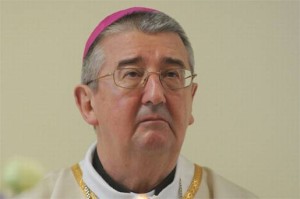
By Sarah Mac Donald - 14 September, 2013
 Archbishop Diarmuid Martin of Dublin has warned that there is a growing tendency towards “tabloidism” in some sectors of the Catholic press.
Archbishop Diarmuid Martin of Dublin has warned that there is a growing tendency towards “tabloidism” in some sectors of the Catholic press.
In an address on Friday afternoon to the ‘Faith of Our Fathers’ conference in Kilkenny, organised by the Catholic Voice newspaper, the Archbishop also criticised the worrying phenomenon of blogs, which are not just “partial and sectarian but at times very far away from the charity with which the truth should be expressed.”
In his analysis of the role and contribution of the Catholic media, he said accuracy is more important than the exclusive ‘scoop’ which may often be unfounded.
He referred to Pope Francis’ comments in which he said bluntly that a Church which is not marked by Christian charity has ceased to be the Church.
“Christian charity is not about short-term emotion. It is about being close to people and carrying them in their woundedness,” he said.
“We can repeat doctrine ad nauseam. We can enounce moral teaching with clinical clarity. But all of that will be worthless and the Church’s teaching will appear to others like any other ideology, if we do not reflect in our lives – personal and institutional – the loving embrace of the God revealed in Jesus Christ.”
He said journalists and those in involved in the Catholic media have to live the Good news of Jesus Christ and be seen to witness to the Good News.
“We do not need a conformist Church. We need a Church of mature and authentic common commitment and concern for the spreading of the Gospel. That Gospel is perennially new and must always be presented in ways that are new, but we are not called to reinvent the fundamentals of faith.”
“The Gospel is Good News and must always be presented with the enthusiasm which is the inevitable characteristic of those who believe that they are the bearers of good news,” the leader of the Church in Dublin commented.
Admonishing ‘uncritical lovers’ of the Church who, out of a misplaced sense of loyalty, try to deny the existence of tensions and problems in a way that may damage the credibility of the Church, the Archbishop said the Church needs a media “that is not afraid to expose mistakes and failures, but whose motive is to challenge the community of believers to continue on the path of conversion.”
“The Catholic media will not be credible if it does not confront sins, abuse, weaknesses and failings within our community,” he warned.
However, he also suggested that the Catholic media would be less than objective if it did not also point to more positive events and happenings.
Elsewhere in his address on Friday, Archbishop Martin suggested that the highest professional standards which are expected of Catholic journalism also applied to management of the Catholic media and involved accurate publication of information about ownership and funding.
“We have seen worldwide how freedom of the press can only be guaranteed when there is transparency of ownership and financial and ideological interest. In Ireland, such openness and transparency will be more clearly required, on the part of the Church institutions and of any grouping which is considered a charity, under the new charity legislation,” he stated.
“The Archdiocese of Dublin and other Church institutions are working to ensure full compliance with the new norms. The Catholic press must do likewise.”
Responding to the Archbishop’s criticisms, the Editor of the Irish Catholic newspaper, Michael Kelly, told CatholicIreland.net, he was “glad to see the Archbishop highlighting the important role of the Catholic press.”
But he added, “The role of a Catholic journalist is a difficult one. I think many Church leaders struggle to understand the role of an independent Catholic press – loyal to the Church while unafraid to point out and highlight what is wrong in the Church.”
He rebuked those in leadership in the Church saying often they would prefer if Catholic newspapers simply reported on “the opening of a new parish centre or reported word-for-word the homilies of bishops.”
He said there was “little appetite” among the Church’s leadership for the sort of probing journalism that asks the questions that need to be asked.
“The Archbishop speaks of a lack of charity. I would say journalists feel this lack of charity too, sometimes from those who are in leadership positions in the Church. It’s easy to snipe from a distance without stopping to think about the good faith of those involved,” he said.
The Catholic editor suggested the difference between the Catholic media and the mainstream media was that the Catholic press aimed to highlight what is wrong in order to make things better.
“Church leaders need to become more comfortable with those who criticise things in the Church because they love it and want it to be better. We frequently highlight the crisis in vocations. Not to emphasise negative news, but to point out to those in leadership the very real crisis this is for the Church and to encourage them to do more to address the crisis,” he said.
The Irish Catholic Editor noted that “The Archdiocese of Dublin used to have a Catholic newspaper which was closed down. Maybe that’s an idea for the Archbishop to look at: most Catholic dioceses in the US – with much smaller populations than Dublin – have a vibrant Catholic newspaper. However, such a publication would always suffer from a lack of independence,” he said.
Other speakers at the ‘Faith of Our Fathers’ conference in Kilkenny this weekend include businessman, Declan Ganley, former MEP Dana Rosemary Scallan, Bishop Seamus Freeman of Ossory and Irish Times columnist, John Waters.